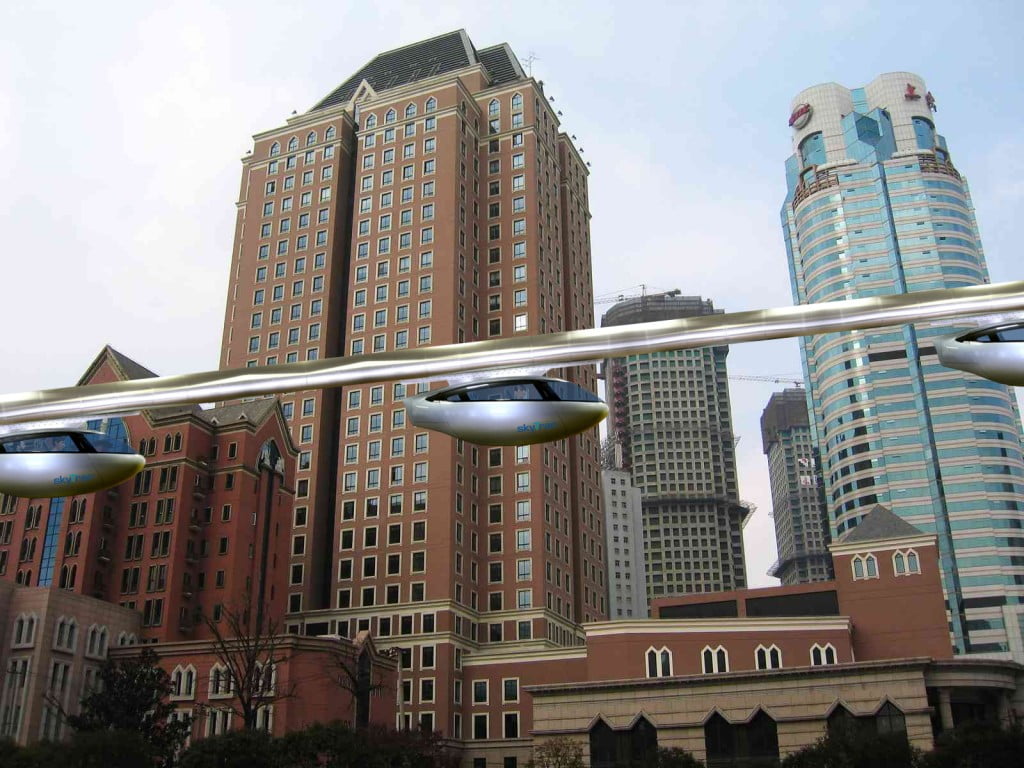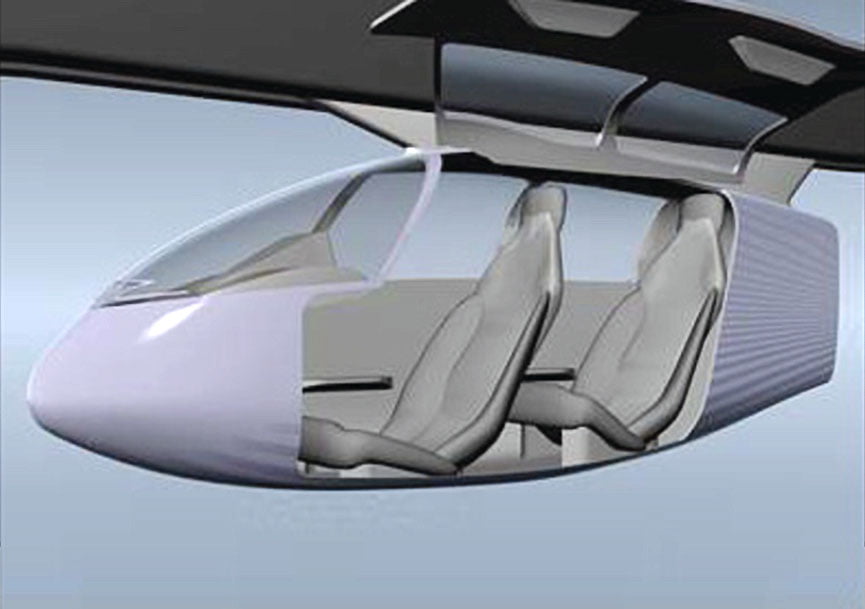It just may be the revolution to mass transit that large urban cities desperately need.
A few weeks ago, NASA-based skyTran Inc. and Israel Aerospace Industries (IAI) entered into an agreement to construct an elevated Personal Rapid Transit System in Lod, Israel. The skyTran system has been touted as revolutionary: High-speed, low-cost, green, automated, and personal.
As the company hopes, we may all soon be heading to and from work on computer-controlled, two-person ‘hover cars’ that use magnetic-levitation technology. Tethered to monorail tracks at least 20 feet above the ground, skyTran’s cars are expected to reach speeds of nearly 240 kilometers (149 miles) per hour. Additionally, they can transport up to 12,000 people an hour per guideway. “That is more than a light rail and equal to three lanes of highway,” said skyTran CEO Jerry Sanders in an interview with Reuters.
 The agreement, signed by Sanders and Director of IAI’s Lahav Division, Yosef Melamed, will allow for the construction of a demonstration system, a 400-500 meter loop that will test skyTran’s proprietary technology in a controlled environment. If successful, the first commercial skyTran system will be built in Tel Aviv by the end of 2016, according to skyTran’s website.
The agreement, signed by Sanders and Director of IAI’s Lahav Division, Yosef Melamed, will allow for the construction of a demonstration system, a 400-500 meter loop that will test skyTran’s proprietary technology in a controlled environment. If successful, the first commercial skyTran system will be built in Tel Aviv by the end of 2016, according to skyTran’s website.
Meet the next generation urban vehicle that knocks Segway out of the water
skyTran: From Israel to the world
Pending the success of the pilot in Israel, bustling cities around the world including metropolises in the United States, France, and India could begin to see skyTran systems constructed in their neighborhoods, paving the way for a future where buses and cars may no longer be the primary form of urban and suburban transportation.
If skyTran’s pilot program at IAI’s campus turns out to be successful, public transit nightmares may become a thing of the past. With their computer-controlled system, a passenger can easily call up a vehicle to any skyTran station using a smartphone or computer, tell it exactly where to go, and it will transport him or her directly to the desired destination with zero stops along the way. Essentially, the entire system will be run by computers.
Sanders is confident that Israel is the ideal place to construct the first skyTran system. “Israelis love technology and we don’t foresee a problem of people not wanting to use the system. Israel is a perfect test site,” Sanders told Reuters.
In a letter to the company’s supporters, skyTran CEO Sanders added: “With IAI on our one side and NASA on the other, there should be no lingering doubt in our ability to deliver game-changing transportation to the world. Nor should there be any reservations about our technology, our patents, and our potential to exploit worldwide markets,” remarked. Based out of the NASA Ames Research Center in California, skyTran is a NASA Space Act compan, and has benefited from wide access to various NASA technologies and capabilities.
Sign up for our free weekly newsletter
SubscribeCleantech makes its way into transportation history
Not only does Israel love technology, as Sanders states, but Israel is recognized as a global leader in the field of clean technology, and recently topped the 2014 Global Cleantech Innovation Index, placing ahead of countries such as the United States, Finland, and Sweden. Likewise, skyTran says that creating technology that is better for the environment is at the core of its mission. Their vehicles are powered by clean, renewable energy and emit virtually no pollution. “The power used in two hair dryers can fly you at over 62 mph with skyTran,” according to their website.
The company predicts a total cost of $80 million, or $9 million per mile, for the commercial system they intend to build in Tel Aviv in 2016. Comparatively, this is much less than the average cost of building a mile of a light-rail system or a bus lane, $35 million and $14 million, respectively, according to a study by the US Government Accountability Office from 2000.
Traffic reports on Waze could be a hoax and here’s why
Israel’s government reportedly supports the plan and has already allocated funds to the project. “The only holdup is government bureaucratic approval,” Sanders told Israel21c in an interview. “This plan is supported by every government ministry in Israel. But it requires changing Israel’s master plan to include skyTran because it now includes only rail, and there is no quick shortcut to changing regulations.”
 IAI is fully prepared to move forward with the pilot program on its corporate campus as soon as possible. As Israel’s largest defense company, IAI promises to bring expertise in engineering, robotics and control to the project. “We are proud to be part of this exciting moment in transportation history and to host the first SkyTran system in our grounds,” said Melamed, a director at IAI.
IAI is fully prepared to move forward with the pilot program on its corporate campus as soon as possible. As Israel’s largest defense company, IAI promises to bring expertise in engineering, robotics and control to the project. “We are proud to be part of this exciting moment in transportation history and to host the first SkyTran system in our grounds,” said Melamed, a director at IAI.
With skyTran, cities now have the means to revolutionize transit and reduce their carbon footprints, but whether or not societies are ready to embrace this futuristic form of transportation is a whole different question.
Photos: skyTran
Related posts

Resilient And Nutritious New Plant-Based Milk Aims To Make A Splash

Chocolate From Cultivated Cocoa Comes Without Environmental Toll

Plastic Fantastic: Startup Takes PVC Back To Its Crude Oil Roots






Facebook comments